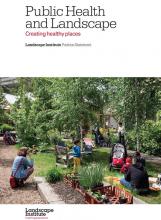The Landscape Institute have launched a position paper (82) on public health and landscape, strengthening the evidence base that landscapes can help create healthy places and improve health and wellbeing. The publication advocates that greater priority needs to be given to the prevention of ill health in public health and social care, and promotes access to good quality landscapes as a valuable preventative measure.
The overarching aim is to provide a better understanding of the role of landscapes and encourage greater collaboration between those concerned with creating healthy places – public health professionals, planners and landscape architects. The Landscape Institute promote landscape character as the interaction between cultural and natural interactions, including urban areas in addition to the wider countryside, in line with the definition of landscape from the European Landscape Convention.
Based on growing evidence the Landscape Institute sets out five principles, illustrated through 22 project examples, which capture positive links between landscape and health. These are:
- Healthy places improve air, water and soil quality, incorporating measures that help us adapt to, and where possible mitigate, climate change;
- Healthy places help overcome health inequalities and can promote healthy lifestyles;
- Healthy places make people feel comfortable and at ease, increasing social interaction and reducing anti-social behaviour, isolation and stress;
- Healthy places optimize opportunities for working, learning and development; and
- Healthy places are restorative, uplifting and healing for both physical and mental health conditions.
Amongst the many examples of these five principles implemented on the ground, an example from Liverpool demonstrated how the cities 2011 Green Infrastructure Strategy could be utilised to aid the identification of target areas for improving health and wellbeing in deprived areas.
The strategy had previously identified that the distribution of green space in Liverpool was unequal, with 18% more green infrastructure in affluent areas than in deprived areas. Liverpool’s Natural Choices for Health and Wellbeing programme provided £300,000 of funding for projects that use local green space to improve health and wellbeing. A total of 38 projects were funded, with over 70% located in the most deprived areas. Projects focused on gardening, growing food and creating and improving the environment. Researchers from the University of Essex collected data on the projects and found that there was an 18% increase in wellbeing among participants and over 80% of projects reported increased physical activity as a key part of their projects achievements.
For more information please visit: http://www.landscapeinstitute.org/policy/health.php
